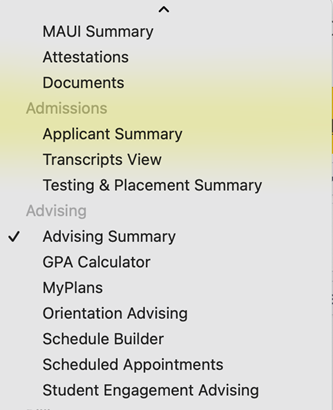Main navigation
Taking detailed notes on your advisees is a critical aspect being an advisor. These notes can help you keep track of important information, such as a student’s academic progress, career aspirations, and any challenges they may be facing. Advising notes can also serve as a reference for future meetings with the same student or for other advisors who may work with the student.
The following steps show you how to access a student’s advising notes and to take a new note:
1. Open the student’s page on MAUI, then select “Advising Summary” in the dropdown menu of Tabs. At the bottom of the “Advising Summary” page, you will see a section of “Student Notes & Files” where all previous advising notes are tabulated.

2. To enter a new note, click on “Add note” to open up an empty form that looks like this one below:

3. What should Advising Notes include?
- Questions and concerns mentioned by the student
- Specific courses recommended by the advisor
- Requirements, policies, and procedures discussed
- Cautions, caveats, or possible consequences mentioned by the advisor
- Referrals made by the advisor
4. Best practices for Advising Notes:
- Use a professional tone
- Be factual and objective
- Use discretion when noting personal disclosures related to health, family, etc.
- For example, instead of “Student is currently in an in-patient facility for treatment of {specific diagnosis},” write something like “Student is experiencing a health issue that prevents completion of this semester.”
5. You can attach one or more files to any note. Relevant documents include:
- Plan of study
- Satisfactory Academic Progress (SAP) appeal form
- Study abroad course approval form
- Academic planning worksheet
6. Share with Student. You can elect to share a note and/or file with the student, who will be able to view the note in the “Advising” section within “Student Records” on MyUI.
7. Notify another UI faculty or staff member. You can have an automated e-mail notification sent to the student’s Principal Advisor(s) or to other individuals whose e-mail addresses you provide. This e-mail does not include the content of the note; individuals must have access to MAUI Advising Notes to read the note.
8. Course abbreviations. Within a note, you can type a University course using the format DEPT1234, and it will expand to include the course title, s.h., and any GEP category when you save the note.
9. Click the “Save” button at the end of the page to save the note.
Every time you meet with your advisee, use this MAUI advising tool to take notes. This ensures that your notes are accessible by other advisors and advising administrators at the University. Students can request access to their Advising Notes and Advising Notes can be subpoenaed by third parties under FERPA.
Taking effective notes on your advisees can help you provide better guidance and support to your students. By following these guidelines and using the MAUI Advising tools, you can ensure that your notes are accurate, organized, and accessible to others who may work with your students. Here are some guidelines to help you take effective notes on your advisees:
- Be thorough: Take detailed notes on your meetings with students, including what was discussed, any action items, and any follow-up that is needed. Include relevant information about the student, such as their major, academic standing, and any personal circumstances that may impact their academic performance.
- Be objective: When taking notes, it is important to be objective and avoid making assumptions or judgments about the student. Stick to the facts and avoid using subjective language.
- Be organized: Use a consistent format for your notes to make them easy to read and reference later. Consider using headings or bullet points to break up your notes into distinct sections.
- Update your notes regularly: It is important to update your notes regularly to ensure that they are accurate and up to date. Make it a habit to review your notes before each meeting with the student and make any necessary updates.
- Be mindful of confidentiality: It is important to protect the privacy of your advisees. Only include information in your notes that is relevant to their academic advising needs and be sure to comply with any relevant privacy laws and university policies.